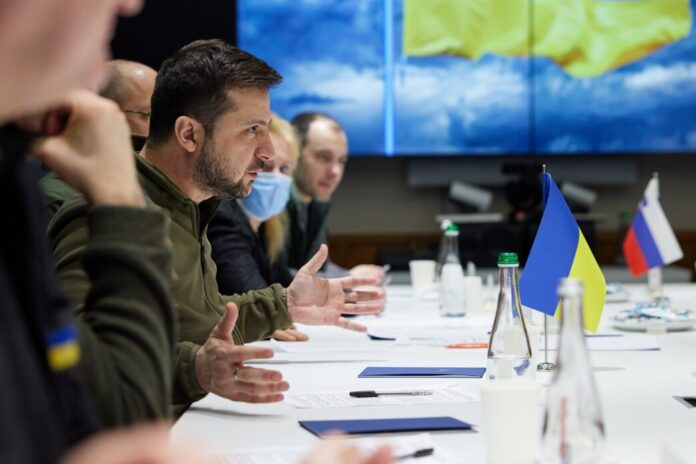The prime ministers of Poland, the Czech Republic and Slovenia safely returned to Central Europe on Wednesday after visiting Kyiv to show support for Ukraine as it defends itself from Russia’s military invasion.
Czech Prime Minister Petr Fiala called on as many countries as possible to equip Ukraine with large amounts of weapons quickly so the country can continue fighting off Russian forces that are trying to take the capital and other cities.
“We have to realize that (the Ukrainians) also fight for our independence, for our freedom and we have to support them,” Fiala said after arriving back in Prague. “That’s the reason why we traveled there, to show them they’re not alone.”
He and Prime Minister Mateusz Morawiecki of Poland and Prime Minister Janez Jansa of Slovenia met with President Volodymyr Zelenskyy during their trip to Kyiv on Tuesday, when sustained Russian shelling targeted the city and its suburbs.
They went ahead with the hours-long train journey despite concerns about risks to their security while traveling through a war zone, hoping to inspire more courageous international backing of Ukraine. Polish Deputy Prime Minister Jaroslaw Kaczynski — the chief of the ruling conservative party and his country’s most powerful politician – also made the trip.
The Czech Republic, Poland and Slovenia are members of both the European Union and NATO. Although pronouncing their trip to be an EU mission, officials in Brussels cast it as something the three leaders undertook on their own.
NATO Secretary General Jens Stoltenberg said it was good for Western allies to engage closely with Zelenskyy, but he didn’t clearly endorse the visit to Kyiv.
NATO leaders to hold summit on Ukraine as calls for no-fly zone persist
At home, the prime ministers won widespread praise for traveling into a country at war. Some criticized the leaders for making a risky trip that was largely symbolic and lacked a clear international mandate.
Trending Stories
Ever Forward, ‘cousin’ ship to Ever Given, runs aground off U.S. coast
Justin Trudeau among 313 Canadians banned from Russia
For his part, Zelenskyy voiced his appreciation for the show of support from members of the EU, which he hopes Ukraine will one day be able to join.
The leaders crossed safely by train back into Poland on Wednesday morning. They then had a phone conversation with European Council President Charles Michel, according to Fiala. He tweeted a photo of the three prime ministers sitting around a phone as they briefed Michel on the “results of the mission in Kyiv.”
In Brussels, a spokesperson for the EU’s executive arm said “solidarity is expressed in different ways through different channels.”
“Our solidarity with Ukraine is absolute. It has been repeated on numerous occasions. But more importantly, it is extremely tangible,” European Commission spokesman Eric Mamer said, citing the 27-nation bloc’s financing for refugees and military equipment. “And I can assure you that this solidarity is very well understood by the Ukrainian authorities.”
At a news briefing late Tuesday in Kyiv, Kaczynski said he thinks a NATO peacekeeping mission is needed in Ukraine, or “possibly some wider international structure, but a mission that will also be able to defend itself and that will operate in Ukraine.”
The remark generated some discussion in Poland on Wednesday, with some commentators saying the prospect could risk drawing NATO into a war with Russia.
Morawiecki’s chief-of-staff, Michal Dworczyk, said neither Poland nor anyone else was talking about getting involved in the war, which reached its 21st day Wednesday.
Civilian death toll rises from Russia’s intensifying attacks on Ukraine
The government in Warsaw was making “an appeal not only to Europe but to the whole free world, to work out a solution that would realistically have the ability to suppress the Russian aggression,” Dworczyk told Polish Radio 24
Fiala, the Czech leader, acknowledged that NATO was not ready to enforce a no-fly zone over Ukraine, something Ukraine has requested. But he said Ukrainians would be able to enforce the no-fly zone by themselves if they have enough weapons and anti-aircraft missiles.
In Slovenia, where Jansa’s right-wing SDS party faces a parliamentary election on April 24 amid decreasing popularity, some characterized the Lyiv trip as a public relations stunt.
The Ukrainian crisis “comes in handy for Jansa to improve his image in front of his voters and divert attention from domestic political debates,” the independent Vecer newspaper said in a commentary published Wednesday.
© 2022 The Canadian Press



